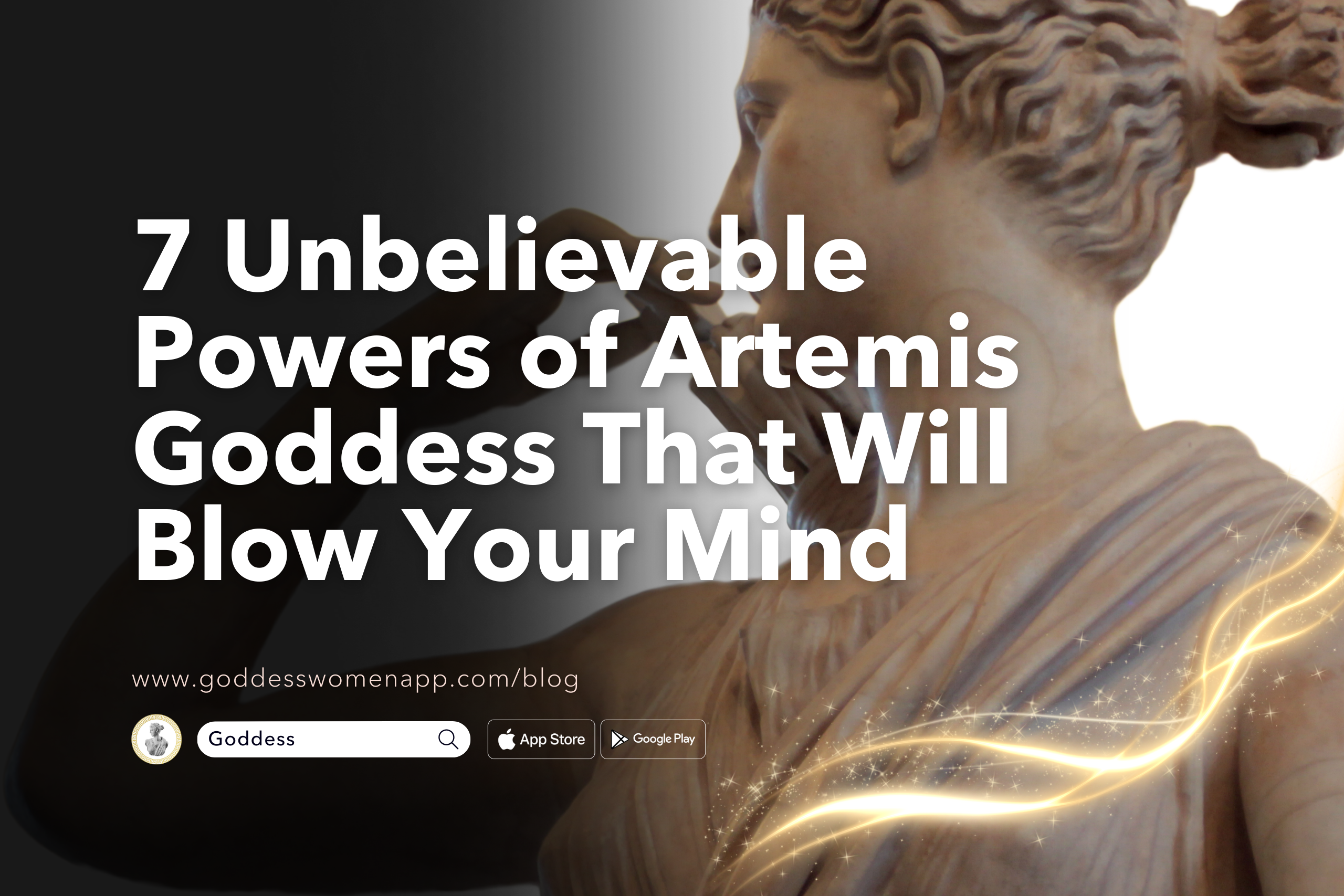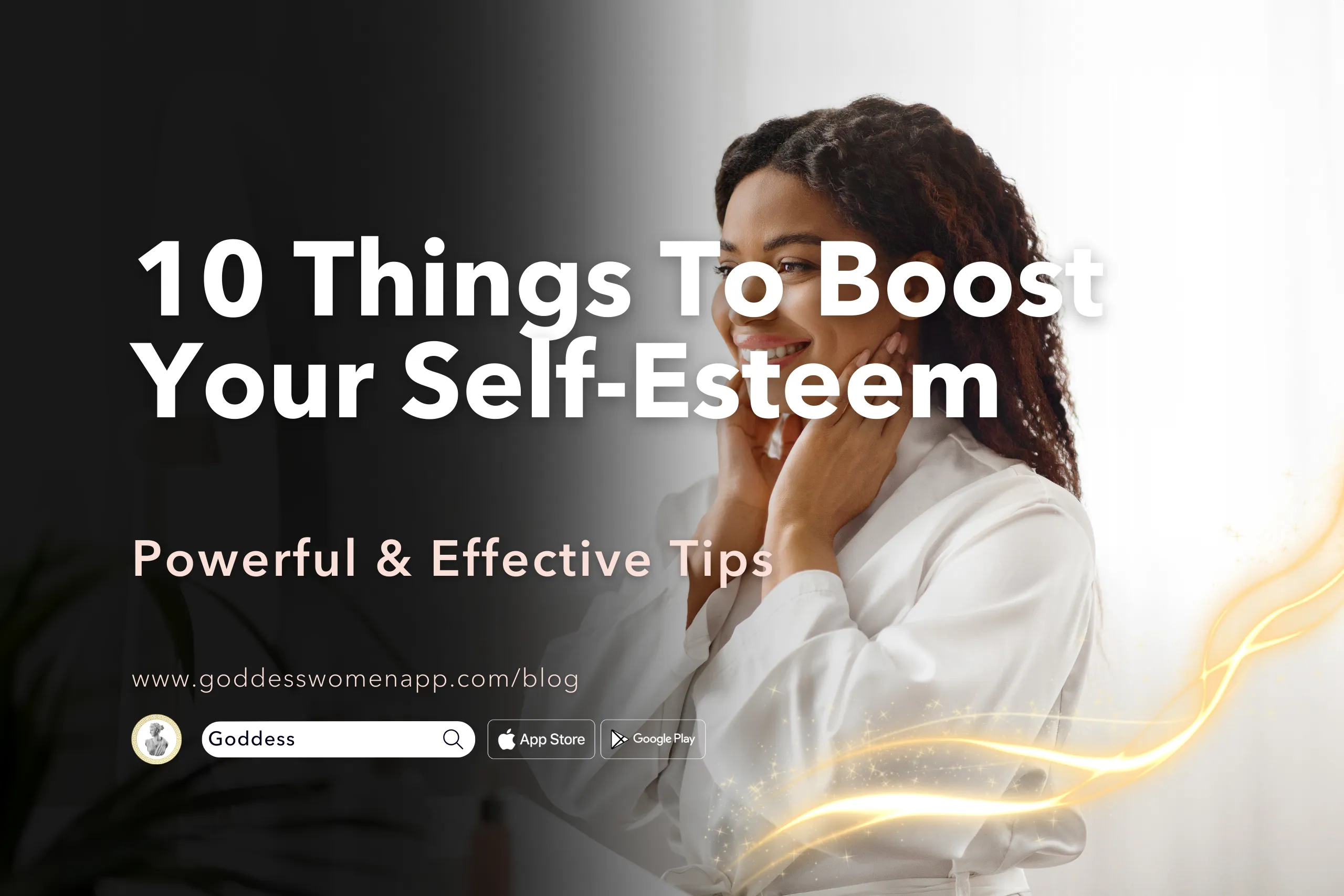Table of Contents
Introduction
Have you ever wondered about the divine forces that roamed the ancient world, wielding powers that shaped the very fabric of mythology? Among these celestial beings, Artemis Goddess of the Hunt, stands out as a figure of awe and inspiration. Artemis isn’t just any Olympian deity; she embodies strength, protection, and the untamed wilderness with an allure that transcends the myths of Ancient Greece.
Today, we’re diving deep into the realm of the divine to uncover “7 Unbelievable Powers of Artemis, Goddess of hunting, That Will Blow Your Mind.” From her unmatched skills in hunting to her fierce independence and protective nature, Artemis’s powers illuminate her role among the gods and her enduring legacy in our world. Get ready to be captivated by the tales of Artemis, goddess of hunting and naked herself, whose legend continues to enchant and inspire through the ages.
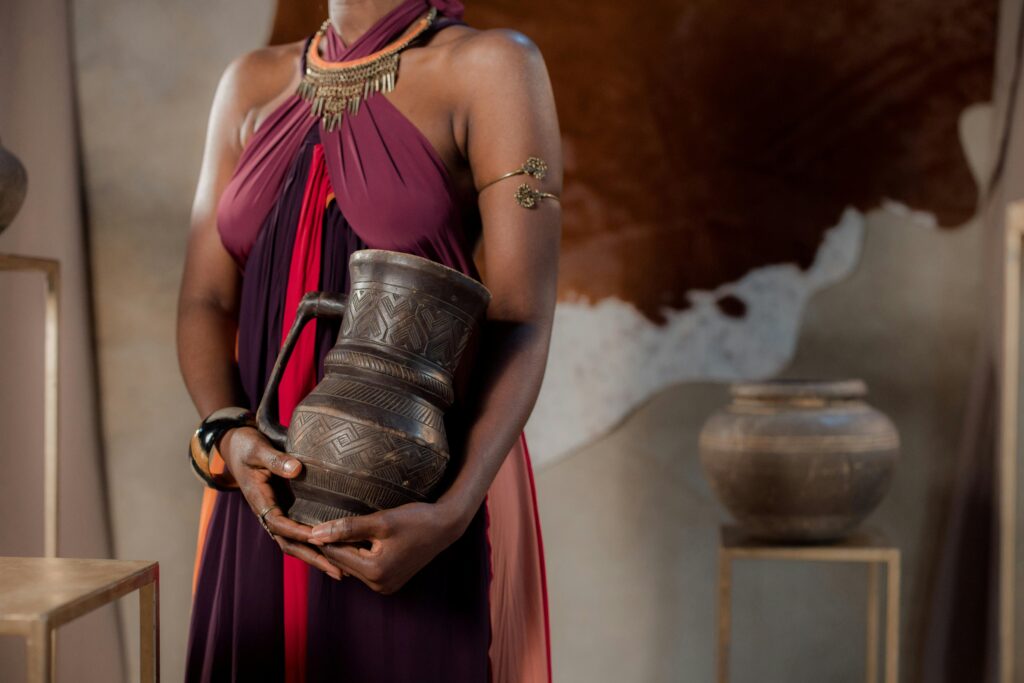
The Origins of Artemis Goddess, Greek Mythology
Artemis’s origins have been quite turbulent. Her father was Zeus’s daughter, Leto. Zeus is the famous godsman and leader of Mount Olympia. Despite his great stories Zeus had one weakness: a lack of trust in Hera. He imprinted Leto with the flesh of Zeus.
Heran grew upset about Zeus’s faithfulness. In revenge, they blocked Leto from bringing up children. After some time she was happy to be on Delos. There she had a daughter Artemis and Apollo. According to the “Homeric Hymenis of Artemis”, the twin girls were born to Ortygie. According to some accounts, Artemis was first.
1. Master Hunter with Impeccable Precision
Artemis’s reputation as the Master Hunter is not merely a title; it’s a testament to her extraordinary skills and precision that were unrivaled among the gods and mortals alike. Born with a bow in her hand, Artemis could strike any target, no matter how elusive, with flawless accuracy. Her arrows, always finding their mark, were symbols of swift justice and divine intervention.
The myths are replete with tales of her hunting expeditions, where she roamed the forests with her band of nymphs, showcasing her prowess and harmony with the natural world. One legend tells of the giant hunter Orion, who dared to challenge Artemis, only to be reminded of her unmatched skill when she effortlessly bested him. Through these stories, Artemis’s hunting abilities are not just about the act of hunting but also signify her role as a guardian of balance in the natural order.
2. Protector of the Young and Innocent
Artemis’s power extends far beyond her hunting capabilities, embodying a profound sense of guardianship and protection for the young and innocent. This aspect of her divinity highlights her compassionate and nurturing side, a sharp contrast to the fierce hunter.
Artemis was venerated as the protector of childbirth and the safeguard of children, ensuring their safe passage into the world and guarding them as they grew. Her protection also encompassed the animal kingdom, where she was seen as the patron and defender of wild animals, especially the young and vulnerable.
The story of Artemis saving the life of Iphigenia, a young maiden about to be sacrificed, exemplifies her role as a savior and protector. By whisking Iphigenia away to the sanctuary of Tauris, Artemis demonstrated her refusal to stand by in the face of injustice, reinforcing her image as a divine guardian of the pure and innocent. Through these acts of protection, Artemis symbolizes the fierce and nurturing force that watches over all beginnings, embodying the dual essence of life itself.
These facets of Artemis’s powers—her impeccable precision as a hunter and her protective nature—paint a picture of a goddess whose complexities and capabilities are as vast as seven wonders of the wilderness she presides over. Stay tuned as we explore more unbelievable powers of Artemis that continue to captivate the human imagination.
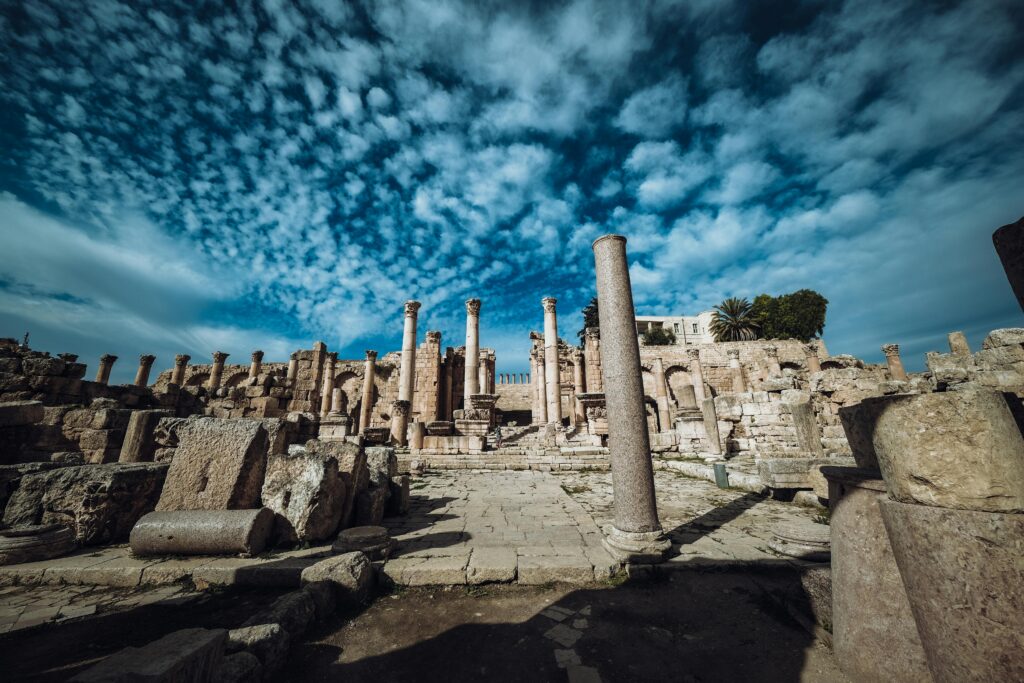
3. Virgin Goddess with Fierce Independence
In the pantheon of Greek deities, Artemis’s status as a virgin goddess is emblematic of her fierce independence and autonomy. This aspect of her divinity is not merely about chastity but represents her sovereign rule over her own life and domain, free from the confines of marriage and partnership that were often imposed on women, both mortal and divine.
Artemis’s commitment to virginity allowed her to roam the wilds unbound, pursuing her passions and duties without distraction or obligation to any consort. Her independence is a source of empowerment, making her a beacon for those who seek to define their paths on their own terms.
The myths surrounding Artemis and her band of maiden followers, the Amazons, who were renowned for their strength and warrior skills, underscore the goddess’s message that autonomy and freedom are power. Artemis’s virginity thus becomes a declaration of her indomitable spirit and an integral part of her divine identity, inspiring generations to value and assert their independence.
4. Power over Nature and Wild Animals
Artemis’s dominion extends deep into the heart of the wilderness, where she wields unparalleled power over nature and all wild animals. As the Goddess of the Hunt and Wilderness, she is intimately connected to the earth and its creatures, communicating with them and influencing their actions with a mere thought. Her affinity with the natural world allows her to command the elements, summoning storms or calming waters, all in harmony with the balance of nature.
This profound bond is celebrated in tales where Artemis rides through the forests on her chariot, accompanied by her sacred animals, including deer and hounds, who move in perfect unison with their mistress.
Her ability to protect and also unleash the wild forces of nature showcases her dual role as nurturer and warrior, guardian of the natural world’s sanctity. Through Artemis, we are reminded of the delicate balance of life and the respect and reverence that the natural world commands.

5. Healing Abilities to Cure and Bring Sickness
Among the myriad of Artemis’s powers, her ability to heal and, conversely, to bring disease, highlights her as a deity of dualities. This power stems from her association with childbirth and women’s health, where she was often invoked for her protective and healing capabilities. Artemis could bestow health and cure diseases, a testament to her benevolence and the protective care she extended to her devotees.
Yet, in the same breath, she could inflict plagues and sickness upon those who crossed her or violated her sacred laws, as seen in the tale of Niobe, whom Artemis punished with lethal precision. This aspect of her power serves as a reminder of the goddess’s multifaceted nature, embodying both creation and destruction, healing and harm. Her ability to navigate these extremes speaks to the complex character of Artemis, a deity who commands both awe and reverence for her capacity to give life and take it away, always in alignment with the cosmic balance she fiercely protects.
These aspects of Artemis’s divinity—her fierce independence, her command over nature and animals, and her dual role as healer and harbinger of sickness—further illustrate the goddess’s complex persona. Through her, we learn about the intricate tapestry of life, where power, autonomy, and the natural order intersect, revealing the depth and breadth of Artemis’s influence in the mythological world and beyond.
6. Gift of Prophecy and Insight
Among the lesser-known yet profoundly impactful powers of Artemis is her gift of prophecy and insight. While Apollo, her twin brother, is more famously associated with oracular powers, Artemis too possessed the ability to foresee the future and provide guidance to those seeking her wisdom. This divine foresight allowed her to navigate the complexities of the gods and the mortal realm, offering protection and counsel to her followers.
She was a beacon of light in the darkness, a guide through the uncertainty of fate. Her temples served not only as places of worship but as sanctuaries where the ancient Greeks sought her prophetic insight, hoping to gain clarity and direction. Artemis’s prophetic gift underscores her role as a protector and advisor, emphasizing her deep connection to the natural and supernatural worlds. Through her, we see the importance of intuition and foresight, qualities that guide us through life’s challenges and uncertainties.
7. Shape-Shifting and Transformation
The power of shape-shifting and transformation is perhaps one of the most magical attributes of Artemis. While not as frequently mentioned as her hunting skills or independence, this ability signifies her mastery over nature and the supernatural realm. Artemis could alter her form or the forms of others, weaving between the physical and mystical worlds with ease.
This power is emblematic of her connection to the wilderness, where change and transformation are constant. One notable myth involves Artemis transforming Actaeon, a mortal who dared to glimpse her beauty while hunting companion she bathed, into a stag, who was then torn apart by his own hounds.
This story, while tragic, illustrates the goddess’s protective nature over her privacy and sanctity, as well as her capacity to enforce divine retribution. Shape-shifting also symbolizes the fluidity of identity and the ability to adapt and overcome, reflecting Artemis’s resilience and versatility as a deity.
Through her gift of prophecy and the mystical ability to shape-shift, Artemis emerges as a deity of immense wisdom and power. Her capabilities extend beyond the physical realm, touching the hearts and minds of those who seek her guidance and protection.
These powers, combined with her fierce independence, nurturing spirit, and command over nature, paint a picture of Artemis as a complex and multifaceted goddess. Her legacy, rich with tales of strength, compassion, and transformation, continues to inspire and captivate, reminding us of the enduring power of the divine feminine in the natural and mythological world.
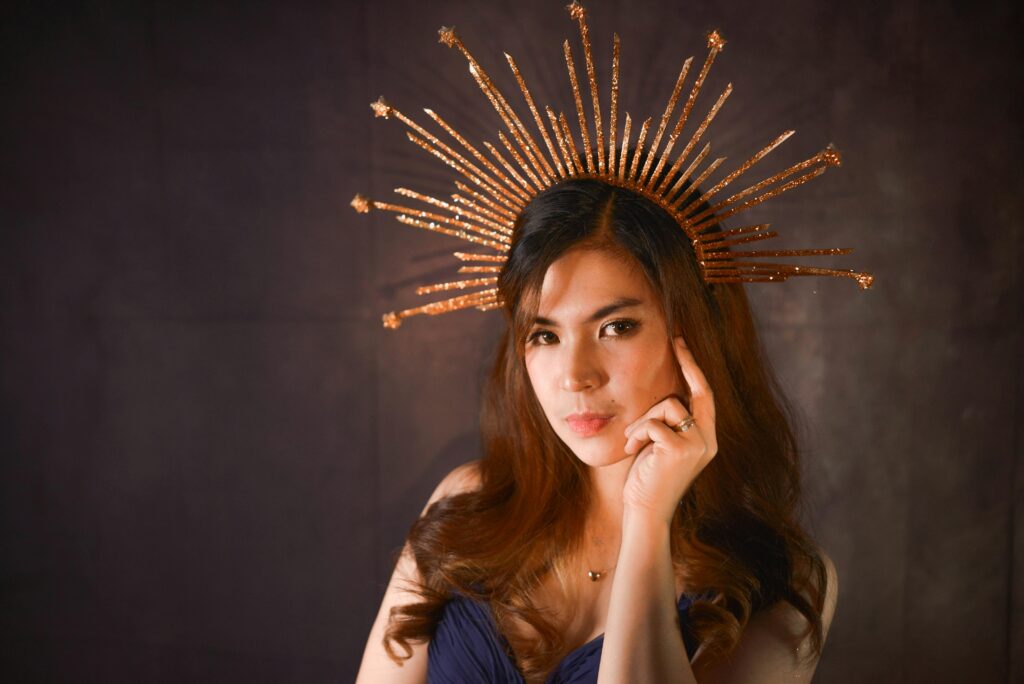
Greek Goddess of the Hunt, Forests and Hills, the Moon, Archery
The Greek mythological system carries a large variety of admired gods bull goddess that inspire. the goddess Artemis is the goddess of hunts and has the greatest popularity amongst ancient Greek deities. It is believed that the goddess is a Greek goddess.
She was the daughter of Zeus, king of gods, and the Titanessesleto. She had one sister, the Apollonian god, The. Artemis was the god of the hunting, but was known for being the god of wild animals, wild life, birth and virginity. A few times she had been regarded as a goddess protecting children and known for helping and treating diseases in females.
Temple of Artemis at Ephesus, Greek Mythology
In Ancient Greece, Artemis ephésia was reverence for fertility in Ephesis nearby, where many believe her home was Ortyga. The cult also includes eastern elements (derived from goddesses like Isis, Cybele and the “Mistress of the Animals”, and its main symbol was the bee palm and the stag. The famous Temple of Artemis of the City (founded 550 BCE) was nearly twice the size as Athenians ‘parthenon at the time of its construction and was considered one of Seven Wonders.
Artemis and Heracles
Heracles had the task of capturing Cerynnisian Hind. The King thought the creature was too quick for him to capture. He said the hero’s ability to capture the sacrificial creature would upset the Goddesses Artemis very much, and her wrath would lead to the demigod’s death. Heracles did not capture a Hind, rather Artemis came in and told him while he captured it. The task was viewed complete following the encounter between the Demigod and the two goddesses.
Worship & Festivals of in Greek Mythology
Throughout Ancient Greece many festivals celebrated Artemis. The famous festival was the Braubronia held near the famed temples in Ancient Greece. The festival is the initiation ceremony for the very young girls and ladies. Other popular festival were Caphyae, Ephebolia Laphrye, Munichia, and Thrargelia. Apollo and Artemis received honors on “thargelias”. The first settlers came from Delos, then came to Athens.
Greek Goddess Artemis’ Sacred Animals / Plants
Besides being an activist, she was an advocate for the environment, wildlife and the natural environment. Eventually, she owned several sacred animals and plants. Her sanctuaries include Asphodell, Amaranth palms, walnuts and oak trees.
Besides protecting the wild nature, her sacred animal population was very high. Among the sacred animals exhibited by Artemis were deer, which drew her car, bear hound hunting dogs, dog, and goat. A god’s sacred object is the Ceryniteian Hind, a deer with golden horns.

Is Artemis a Good or Bad Goddess?
In the rich tapestry of Greek mythology, Artemis stands out as one of the most complex and multifaceted deities, embodying a wide array of attributes and responsibilities. To categorize Artemis—or any mythological figure—as purely “good” or “bad” oversimplifies the nuanced portrayal of deities in ancient myths.
Instead, Artemis embodies the duality of nature itself, reflecting both its nurturing and destructive aspects. This article delves into the character of Artemis, exploring the depths of her divinity to understand the balance of light and shadow she represents.
Artemis, known as the Goddess of the Hunt, the Wilderness, Childbirth, and Virginity, commands a broad spectrum of divine powers. She is revered as a protector of the young and the innocent, a guardian of women in childbirth, and a patron of the natural world.
These roles highlight her benevolence and nurturing spirit, characteristics that underscore her “goodness.” As a protector of the wilderness and all wild animals, Artemis symbolizes the harmony and balance of nature. She ensures the safety of the young, both human and animal, reflecting a deep compassion and empathy that resonates with the universal theme of maternal protection.
Moreover, Artemis’s commitment to independence and her role as a virgin goddess underscore themes of autonomy and self-sufficiency. Her virginity is not merely a physical trait but a symbol of her complete sovereignty over herself and her domain.
This aspect of Artemis champions personal freedom and empowerment, advocating for the right to choose one’s own path without being constrained by societal expectations. In this light, Artemis serves as an emblem of empowerment, especially for women, embodying the virtues of strength, independence, and integrity.
However, the mythology of Artemis also contains tales of wrath and retribution that cast shadows on her divine character. Her fierce protection of her privacy and her followers sometimes manifests in severe punishments for those who transgress her boundaries.
The story of Actaeon, who was transformed into a stag and torn apart by his own hounds for accidentally witnessing Artemis bathing naked alone, serves as a stark reminder of her merciless side. Similarly, the tale of the Aloadae giants attempting to reach Olympus by piling mountains atop one another, only to be thwarted and punished by Artemis, showcases her formidable power and willingness to enforce divine justice, albeit harshly.
These stories reveal a deity who is not merely benevolent but also capable of fierce vengeance, a goddess who demands respect and reverence for herself and the natural order she upholds. This duality reflects the inherent balance of life, where creation is often intertwined with destruction, and nurturing care can swiftly turn into protective aggression.
In conclusion, categorizing Artemis as simply “good” or “bad” does not do justice to her intricate nature. Instead, she embodies the complex interplay of light and darkness, creation and destruction, that defines the natural world and the human experience.
Artemis’s mythology teaches us about the importance of respecting boundaries, the sanctity of nature, and the power of female autonomy. She is a deity of contrasts, whose stories inspire us to embrace our multifaceted selves and to understand that strength and compassion, independence and connection, can coexist within us, guiding us toward a more balanced and harmonious existence.
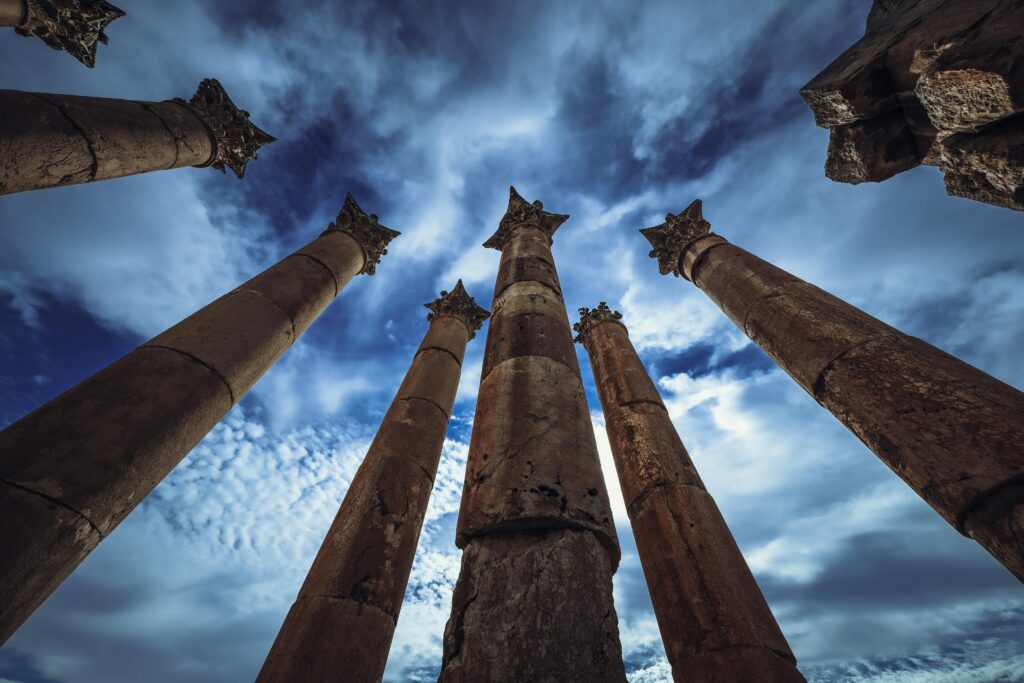
What are 5 facts about Artemis?
Artemis, the ancient Greek goddess of the hunt, wilderness, childbirth, and virginity, is a figure of immense complexity and reverence in mythology. Her character encompasses the beauty and brutality of the natural world, embodying both its nurturing and fierce aspects.
Here are five compelling facts about Artemis that illuminate her multifaceted nature and enduring legacy in Greek mythology and beyond.
Daughter of Zeus and Greek Gods Leto
Artemis was born the daughter of Zeus, the king of the gods, and Leto, a Titaness. Her birth story is a testament to her mother’s resilience and Artemis’s own inherent power. Due to Hera’s jealousy, Leto was forbidden to give birth on terra firma or any island at sea. Eventually, Leto found refuge on the floating island of Delos, where she gave birth to Artemis.
Remarkably, Artemis was born first and then assisted her mother in the birth of her twin sister and twin brother, Apollo, showcasing her precocious strength and capabilities. This origin story highlights Artemis’s deep connections to themes of protection and childbirth, roles she would come to embody as a goddess.
Protector of the Young and Innocent
Artemis is widely recognized as a guardian of the young and innocent, often depicted as a protectress of childbirth and the natural world. This aspect of her divinity showcases her nurturing side, offering a stark contrast to her prowess as a huntress.
Artemis’s protection extended beyond humans to all young animals in the wilderness, emphasizing her role as a divine intermediary between civilization and the untamed natural world. Her temples often served as sanctuaries for women and children, reflecting her encompassing role as a deity of safeguarding and care.
A Virgin Goddess
Artemis’s virginity is a critical aspect of her identity, symbolizing her independence, autonomy, and purity. Unlike many other deities in the Greek pantheon, Artemis remained aloof from romantic entanglements, dedicating herself fully to her divine duties and pursuits.
This commitment to chastity was also a requirement for her followers, particularly her band of nymphs, who were sworn to celibacy. Artemis’s virginity is not merely a physical attribute but a representation of her unbridled freedom and sovereignty, standing as a powerful statement on the autonomy and strength of women.
Master Huntress and Patron of the Wilderness
Artemis’s prowess as a huntress is among her most defining characteristics. She her hunting companion and dog is often depicted with a bow and arrow, symbols of her dominion over the wild beasts of the animal kingdom and the wild spaces they inhabit.
Artemis’s hunting abilities were unparalleled, embodying the primal essence of the hunt—precision, patience, and respect for the natural order. Her close association with the wilderness and its creatures underscores a deep environmental consciousness, emphasizing the importance of harmony with and protection of the natural world.
Dual Nature as Nurturer and Avenger
Perhaps one of the most intriguing aspects of Artemis is her dual nature as both nurturer and avenger. While she fiercely protects the innocent and presides over childbirth with compassionate care, she is also quick to defend her honor and the sanctity of her domain with formidable wrath.
The stories of Artemis punishing transgressors, such as the hunter Actaeon or the boastful queen Niobe, highlight her capacity for vengeance against those who disrespect her or the natural laws she embodies. This duality reflects the complex interplay of life and death, creation and destruction, that Artemis governs, serving as a potent reminder of the respect and reverence owed to the natural and divine orders.
These five facts about Artemis offer a glimpse into her rich and complex character, revealing a deity who is both powerful and compassionate, wild and wise. Artemis’s enduring legacy in mythology political philosophy, and popular culture speaks to the universal themes she represents: the majesty of the natural world, the strength of female autonomy, and the delicate balance between nurturing care and righteous retribution.

Who did Artemis fall in love with?
Artemis, the Greek goddess of the hunt, wilderness, childbirth, and virginity, is traditionally portrayed as a virgin deity, one who shuns romantic entanglements to focus on her divine duties. Unlike many of her Olympian counterparts, Artemis’s myths predominantly highlight her independence, strength, and dedication to protecting the young and innocent, as well as her role as a patroness of the natural world and its untamed beauty. However, the question of whom Artemis might have loved is intriguing, considering her firm stance most myths have on maintaining her chastity and autonomy.
In classical mythology, there are few stories that hint at romantic feelings involving Artemis, largely because her identity as a virgin goddess is a defining attribute norse mythology. Nonetheless, there are tales, albeit less canonical, that suggest moments of affection or connection with others, though these do not depict romantic love as we might understand it today. Instead, they offer glimpses into Artemis’s complex character, illustrating her capacity for deep friendships and alliances.
One figure often mentioned in discussions about Artemis’s affections is Orion, a mortal hunter. According to some versions of the myth, Artemis and Orion shared a close bond, united by their prowess in hunting. Their relationship was based on mutual respect and companionship, with some accounts suggesting that Artemis harbored deep feelings for Orion.
However, their story ends in tragedy, often attributed to the jealousy of Apollo, Artemis’s twin sister and brother, who feared that Orion would eventually win Artemis’s heart, leading her to forsake her vows of eternal virginity. Apollo tricked Artemis into shooting Orion, either through a challenge or by deceit, depending on the version of the myth.
Upon realizing her mistake, Artemis was filled with grief, showcasing the depth of her affection for Orion. Despite this, the story emphasizes Artemis’s commitment to her divine responsibilities and her eternal maidenhood, rather than portraying a traditional love tale.
Another myth that hints at a form of affection involves the giant hunter Alpheus, who was said to be smitten with Artemis. Attempting to catch her attention, Alpheus pursued her, only for Artemis to evade him, illustrating her desire to remain untouched and free from romantic entanglements. This story, like that of Orion, reinforces Artemis’s resolve to maintain her independence and purity, core aspects of her divine identity.
The mythology surrounding Artemis and her interactions with figures like Orion and Alpheus underscores the complexity of her character. It reveals a goddess capable of forming deep connections and experiencing profound loss, yet unwavering in her dedication to her principles and divine duties. Artemis’s stories do not focus on romantic love but rather on the themes of companionship, loyalty, and the sacrifices inherent in adhering to one’s convictions.
In summary, while traditional myths do not depict Artemis as falling in love in the romantic sense, they do explore her capacity for strong, meaningful relationships. These stories reflect Artemis’s multifaceted nature as a deity of both compassion and fierceness, underscoring her role as a fierce protector and guardian over all she holds dear. Her mythology teaches us about the strength found in independence and the power of unwavering dedication to one’s values and duties.

Why was Artemis a virgin?
Artemis’s virginity is a defining characteristic of her mythology, symbolizing far more than a mere absence of sexual relations. It represents her autonomy, strength, and a profound connection to the natural world and its cycles.
Understanding why Artemis was a virgin requires delving into the cultural, religious, and symbolic layers of the ancient world of Greek mythology, ancient world where virginity was not solely a physical state but a powerful emblem of independence and purity.
Symbol of Autonomy and Independence
Artemis’s virginity is foremost a symbol of her autonomy. In a pantheon where many deities and mythological figures are defined by their romantic entanglements and dependencies, Artemis stands apart as wholly self-sufficient. Her virginity allows her to roam the forests and the wild without being tied to the responsibilities and vulnerabilities that romantic relationships often entail.
This independence is crucial for her role as the goddess of hunting dog the hunt and the goddess of hunting naked wilderness, where she exhibits dominion over animals and the natural environment, free from the distractions and limitations that may come from such entanglements.
Purity and Connection to Nature
The concept of purity, associated with Artemis’s virginity, extends beyond sexual abstinence to encompass a deeper, spiritual purity that aligns with her domain over the natural world. This purity allows her to communicate with and control wild animals, navigate the wilderness with ease, and protect the sanctity of the natural and untamed places of the world.
It is a metaphysical state that enables her to perform her divine duties effectively, serving as a guardian of the young and innocent, both human and animal. Her eternal virginity itself, in this context, is symbolic of her unblemished connection to the pristine and primordial aspects of nature.
Protector of the Young and Childbirth
Artemis’s role as a protector of the young and a goddess of childbirth further elucidates her virgin status. She oversees the most vulnerable stages of life, embodying the paradox of a virgin goddess who guards the process of birth.
This unique position emphasizes her nurturing aspect, untainted by personal experience of childbirth or motherhood, allowing her to remain impartial and focused on her protective duties. Her virginity grants her a unique perspective on life and purity, enabling her to act as a compassionate guardian without the biases that might come from personal relationships or offspring.
Rebellion Against Traditional Roles
Artemis’s commitment to virginity can also be seen as a form of rebellion against the traditional roles assigned to women and goddesses in ancient Greek society. By choosing chastity, Artemis rejects the expected path of marriage and motherhood, asserting her desire to remain free and unbound by societal norms. This choice reflects a broader theme of female empowerment and autonomy, resonating through the ages as a powerful statement of independence and self-determination.
Artemis’s virginity is a multifaceted aspect of her mythology that speaks volumes about her character and the values she represents. It symbolizes her autonomy, purity, connection to the natural world, and her role as a protector and guardian.
Moreover, it signifies her rebellion against traditional roles, highlighting her as a deity of strength, independence, and female empowerment. Artemis’s virgin status is not merely a personal choice but a profound declaration of her divine identity and the principles she stands for, making her a unique and enduring figure in Greek mythology.

Conclusion
As we journey through the realms of myth and legend, exploring the “7 Unbelievable Powers of Artemis, Goddess of hunting, That Will Blow Your Mind,” we uncover a figure of unparalleled complexity and depth.
Artemis, the Goddess of the Hunt, embodies a spectrum of divine attributes—from her unmatched prowess as a hunter and her fierce independence to her profound connection with nature, her nurturing spirit, and her capabilities as a healer and protector. Her powers of prophecy and shape-shifting further illustrate her mastery over both the physical and mystical realms, marking her as a deity of transformation, insight, and wisdom.
Artemis’s legacy transcends the ancient texts, offering timeless lessons on the importance of autonomy, the sanctity of the natural world, and the power of transformation.
She inspires us to embrace our strength, protect the innocent, and navigate life’s uncertainties with courage and foresight. In Artemis, we find a symbol of empowerment, a reminder of our own potential to adapt, change, and wield our inner power with grace and determination.
Are you inspired by the strength, independence, and multifaceted nature of Greek Goddess Artemis? Do you see reflections of her spirit within yourself? If you’ve ever wondered which divine archetype resonates with your own life’s journey, we invite you to explore further.
Visit the Goddess app and embark on a journey of self-discovery to see whether Artemis’s archetype aligns with your personal path. Discover your connection to the divine feminine and unlock insights into your strengths, challenges, and the unique powers you hold within. Artemis’s legacy is not just a tale from the past; it’s a living inspiration, urging us to find harmony with nature, embrace our true selves, and navigate our lives with wisdom and courage.
Join us on the Goddess app, and let’s uncover whether the spirit of Artemis guides your path. Embrace your inner goddess, and embark on a journey of empowerment and discovery today.

